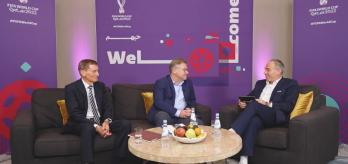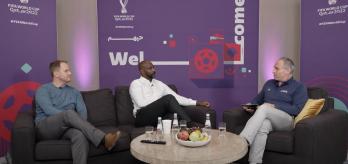In the first of a three-part series of conversations with the technical directors of the different confederations, Ulf Schott, FIFA's Head of High Performance Programmes, sat down with Owain Prosser and Jason Roberts to discuss what they have learned from the current World Cup and how FIFA is helping them tackle the special challenges of developing the game in their incredibly diverse regions.
Part 1: The role of the technical director
00:07
Prosser's role
In the first part of the interview, Prosser and Roberts explain their individual roles, thus proving that no two "technical director" jobs are ever exactly the same. Prosser's official title is the OFC's Head of High Performance, but his work is actually focused on two interlinked areas: widening access to professional education opportunities for players, coaches, referees and administrators, and developing grassroots footballing identities within member associations. Once these identities are established, development programmes can be built around them, leading to success on the pitch.
05:03
Roberts' role
Jason Roberts, on the other hand, is CONCACAF's "Director of Development". His job title reflects the fact that his confederation's member associations are at very different stages of development. With this in mind, Roberts’ department has a holistic approach to developing football in the region, focusing on a variety of areas such as coach education, professional football, the women’s game and social responsibility. As he explains, his experience as a former Grenada international gives him a unique perspective on the problems he is asked to solve.
Part 2: Learnings from the FIFA World Cup
00:07
Impact of hosting a global tournament
Both confederations will be hosting FIFA World Cups in the near future, with the next Women's World Cup being played in Australia and New Zealand next year, and the next men's tournament due to be staged in Canada, the United States and Mexico in 2026. In this section, the two technical directors consider the impact these tournaments can have across their confederations. For Oceania, a region that continues to face challenges around gender equality, having the world's top female footballers playing in New Zealand is likely to change attitudes.
05:05
World Cup empowerment
In North and Central America, by contrast, the men's World Cup is an opportunity to empower member associations and develop the game by embedding talent development structures, improving the standard of coaching, and giving smaller nations more chances to take part in competition. Achieving all this requires investment, and the data FIFA has collected during the current World Cup in Qatar could be useful in this regard. When understood properly, it can be used to inform future performance programmes and persuade decision-makers to invest in the game.
Part 3: Impact of technical observations
00:07
Different ways of winning
The conversation then moves to developments on the pitch. One of the key lessons Roberts and Prosser have drawn from FIFA World Cup Qatar 2022™ is the fact that there is always more than one way to win, and that small nations can punch above their weight by making the most of their strengths. Costa Rica is a prime example of a small nation that lacks the technical ability of some of the "bigger" teams, but has evolved a playing style that can cause problems for traditional powerhouses.
04:45
Idiosyncratic football
Incorporating lessons from Qatar should help individual member associations forge distinct footballing identities and raise the overall standard of play. Again, data can play a key role by helping teams work out what they do best, but you have to understand the data properly before you can analyse it. Choosing the right metrics and benchmarks is crucial, which is why individual member associations need to be given the freedom to develop their own philosophies and decide which metrics they value most.
Part 4: Regional challenges
00:07
Impact of geography
The penultimate part of the interview considers the unique challenges the two regions face as they look to develop the game. For example, OFC is made up of 13 island states and territories, spread over a vast area. This makes logistics and organising events difficult. On the other hand, the small number of member associations means the confederation can provide tailor-made support for all of its members, and the relationships between member associations are also strong, meaning there is a constant exchange of ideas between them.
06:32
CONCACAF ecosystem
In some respects, CONCACAF in a similar position, in that there are huge differences between its 41 members both on and off the pitch. Roberts explains that the confederation is determined to encourage meaningful competition to drive up standards, and creating a professional football environment across the region is a top priority. The overall aim is to show member associations that there is an ecosystem within CONCACAF, and that players, coaches, teams, referees and administrators have opportunities to progress through this ecosystem.
Part 5: The Talent Development Scheme
00:07
Multifaceted support
Finally, our technical directors turn their attention to FIFA's Talent Development Scheme, which aims to give every talent a chance. Both are excited about the scheme, but the support it provides will take different forms in different parts of the world. In Oceania, for example, associations like New Zealand are looking to move into the elite of the men's game, whereas others are keen for more regular opportunities to take part in competitions, or to exchange expertise with countries in other parts of the world grappling with similar challenges.
05:33
Allowing MAs to develop
Similarly, the impact of the scheme within CONCACAF will be at the level of individual associations, and each will have their own targets to meet. With that diversity in mind, the confederation will look to support high performance by creating a positive environment for the associations to develop, including by working with FIFA to professionalise football in the region and give talented individuals the chance to ply their trades in professional leagues outside their home countries where necessary.













